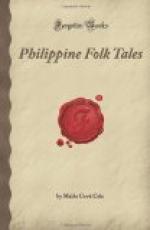“I am hurrying to get the seeds out of this cotton,” said the grandmother, “and as soon as I sell it, I will buy us some food.”
At this the boy fell into a rage, and he picked up some cocoanut shells and threw them at his grandmother. Then she became angry and began to whip him with her spindle, when suddenly he was changed into an ugly animal, and the cotton became hair which covered his body, while the stick itself became his tail.
As soon as the boy found that he had become an ugly creature he ran down into the town and began whipping his companions, the gamblers, with his tail, and immediately they were turned into animals like himself.
Then the people would no longer have them in the town, but drove them out. They went to the forest where they lived in the trees, and ever since they have been known as monkeys. [162]
The Virtue of the Cocoanut
Visayan
One day a man took his blow-gun [163]and his dog and went to the forest to hunt. As he was making his way through the thick woods he chanced upon a young cocoanut tree growing in the ground.
It was the first tree of this kind that he had ever seen, and it seemed so peculiar to him that he stopped to look at it.
When he had gone some distance farther, his attention was attracted by a noisy bird in a tree, and he shot it with his blow-gun. By and by he took aim at a large monkey, which mocked him from another treetop, and that, too, fell dead at his feet.
Then he heard his dog barking furiously in the distant bushes, and hastening to it he found it biting a wild pig. After a hard struggle he killed the pig, and then, feeling satisfied with his success, he took the three animals on his back and returned to the little plant.
“I have decided to take you home with me, little plant,” he said, “for I like you and you may be of some use to me.”
He dug up the plant very carefully and started home, but he had not gone far when he noticed that the leaves had begun to wilt, and he did not know what to do, since he had no water. Finally, in despair, he cut the throat of the bird and sprinkled the blood on the cocoanut. No sooner had he done this than the plant began to revive, and he continued his journey.
Before he had gone far, however, the leaves again began to wilt, and this time he revived it with the blood of the monkey. Then he hastened on, but a third time the leaves wilted, and he was compelled to stop and revive it with the blood of the pig. This was his last animal, so he made all the haste possible to reach home before his plant died. The cocoanut began to wilt again before he reached his house, but when he planted it in the ground, it quickly revived, and grew into a tall tree.
This hunter was the first man to take the liquor called tuba [164] from the cocoanut tree, and he and his friends began to drink it. After they had become very fond of it, the hunter said to his friends:




